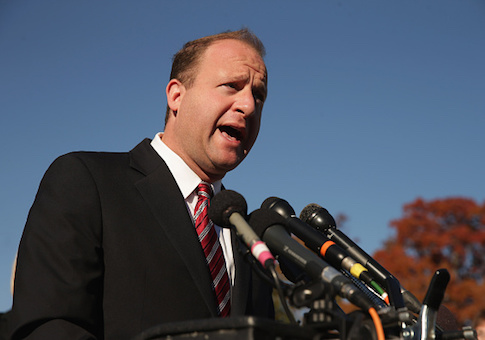Democratic Rep. Jared Polis has cut his campaign for governor a series of six- and seven-figure checks this year, nearly all of which came on or about the same day that the campaign got bad news about the surge of intra-party challenger Cary Kennedy, a former state treasurer.
The upshot, according to one long-time political watcher in the state, is that the presumed front-runner has good reason to believe he is behind and is anxious about it, with the primary voting concluding in less than a month.
Polis has a long Democratic pedigree in the state, having previously served on the state board of education, and is currently in his fifth and final term as the U.S. representative for Colorado's 2nd Congressional District. He is one of the wealthiest members of Congress, and has a history of financing his own campaigns and showering donations on other Democrats in the state.
All of this combined to make him the presumed front-runner for many months ahead of the 2018 campaign. Reports at the time noted that the specter of facing a self-financed multi-millionaire was enough to encourage one well-known and well-liked rival decide to drop out of the race.
"You're on to it cold," Colorado political analyst Floyd Ciruli said, after the Washington Free Beacon showed him the way the Polis donations matched unfolding events. "He may well be behind."
"His experience in life has been that money can solve the problems," Ciruli added.
Campaign finance records show Polis cut a check of $1.87 million to his campaign on Jan. 26.
News searches around that time showed the release of a poll from the American Politics Research Lab, a non-partisan project at the University of Colorado, indicating Polis leading the Democratic pack with 24 percent. However, the same poll also showed a large majority of undecided Democratic voters at 58 percent, and Kennedy just a few percentage points behind.
On March 7, Polis wrote a check for $2.2 million to his campaign. That was the same day that that a non-binding straw poll of Democrats at precinct caucuses showed Kennedy not just leading Polis, but taking a slight majority of the overall vote.
About five weeks later, on April 14, the Democratic surge for Kennedy continued its momentum after she won a slight majority of the party faithful at the state party convention, giving her the coveted top line on the primary ballot. Campaign finance records show Polis wrote a check to his campaign for $750,000 dated just two days after the loss.
Finally, on May 3, Polis cut a $1.5 million check for the campaign. That funding came less than two days after Kennedy announced she had won one of the most sought-after Democratic endorsements in the state: former senator and former Interior secretary Ken Salazar.
Around that time, Polis also announced the endorsement of former congresswoman Pat Schroeder. According to Ciruli, Kennedy had clearly scored the bigger victory.
"I think [Schroeder's endorsement] has some value, but Salazar is much more valuable. He could have been the governor had he been the nominee, these people (Polis and Kennedy and others) probably wouldn't have been in it," if Salazar had entered the race.
Requests for comment to the Polis campaign were not returned.
Polis cofounded Blue Mountain Arts, which offered an online greeting card service in the earliest days of the internet. He sold the business just months before the peak of the dot-com bubble for roughly $800 million in stock and cash.
Polis waged a $1 million campaign to win a six-year term to the state board of education in 2000, according to the Denver Post. Ciruli said before that, he could not think of a campaign for the same post that had ever spent more than $50,000. His opponent in that race spent $10,000, and Polis won "by a mere 90 votes."
"Generally speaking, no one really elects Jared Polis," Ciruli said. "He really has to overwhelm the competition with money. And he's certainly willing to try it."
When Polis ran for Congress in 2008, all he had to do was win the Democratic primary; the district was considered to be safe because it included the liberal base of Boulder, also Polis' hometown.
Polis raised $7.3 million in that race, most of it from himself. His closest competitor, Joan Fitz-Gerald, raised about $1.8 million.
"The less-wealthy candidates both said that Polis' cash changed the dynamics of the race, forcing them to focus on fundraising and spend less time on the campaign trail," a Denver Post story at the time noted.
"'If we'd all been given the same amount of money at the beginning, this race would have looked a lot different,' [Joan] Fitz-Gerald said last week. 'It's like watching a tsunami come . . . and you're not sure how big it's going to be.'"
One major shift to the voting dynamic this year: Colorado's election will be the first in which unaffiliated voters can participate in party primaries, as long as they keep their choices confined to a single party.
"My theory is he's running out of people to persuade that he's the superior candidate under these circumstances, so he may be looking at this new element—1.1 million unaffiliated voters who have never participated to any extent in a primary are getting a ballot on Monday," Ciruli said. "And all they've got to do is pick one side or the other. My estimate is not only that a couple hundred thousand will do that, more will do that on the Democratic side than on the Republican side."
According to the latest campaign finance figures available from the Colorado Secretary of State's website, the Polis campaign has raised just over $8 million, the overwhelming bulk of that coming from the candidate. The campaign has slightly more than half-a-million cash on hand.
Ballots are being mailed to Colorado voters beginning Monday, and voting concludes on June 26.
